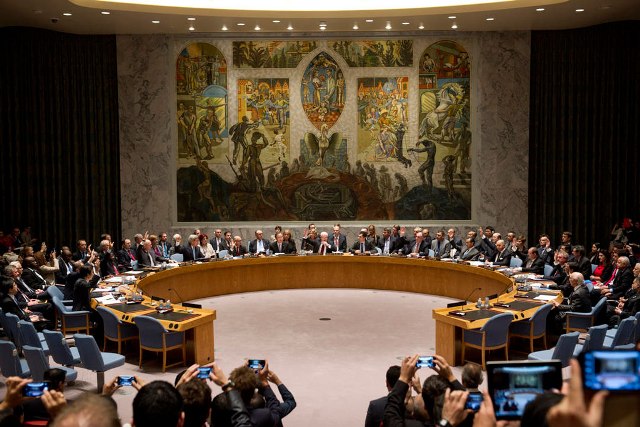 The need to justify the UK’s seat on the Security Council may force future governments to take a more proactive role in peacekeeping [picture: UN.org]
The need to justify the UK’s seat on the Security Council may force future governments to take a more proactive role in peacekeeping [picture: UN.org]
The UK’s military doctrine on ‘peace support’ has now been replaced by ‘stabilisation operations’. In July 2011 the MOD, FCO and Department for International Development published its Building Stability Overseas Strategy, which in particular emphasised ‘upstream intervention’ in likely conflict zones to strengthen weak governments and prevent state failure. In military terms, this follows up (to take one example) the work done by British military training teams attached to African armed forces over the past thirty years.
However, the post-2008 financial crisis and the Coalition’s austerity measures of the October 2010 Strategic Defence and Security Review led to swingeing reductions in the UK armed forces, including the loss of a carrier capability until the end of the decade. All of these reductions have a profound effect on the UK’s ability to project military power overseas. The Army will be reduced to 82,000 regular troops, supposedly balanced by the planned expansion of the part-time Army Reserve (formerly the Territorial Army) from 19,000 to 30,000. This not only entails a loss of corporate knowledge within the regular force, but it raises important questions about the recruitment, training and retention of new reservists into the standing force which remain unanswered. Reservists from all three services did volunteer for operational tours in Yugoslavia during the 1990s and early 2000s, and thousands were mobilised for the Iraq and Afghan conflicts. Yet there seems to be an assumption on the part of the Coalition government that recruiting targets for the reserves will be met, that civilian employers will be compliant in granting time for training and call-ups, and that the regular Army will be easily able to integrate them into its order of battle.
The likelihood is that the end result of SDSR and current defence reductions will be to leave the UK with armed forces that are less capable of being deployed on overseas interventions, including peacekeeping ones.
Furthermore, for all three armed services the experiences of recent conflicts have overturned institutional presumptions about the British military’s inherent ability to conduct complex ‘wars amongst the people’, in which soldiers, marines, sailors and airmen have to combine more traditional war-fighting tasks with an array of more pacific ones—such as post-war reconstruction, the disarmament and reconciliation of warring factions, or the re-training of local security forces. The experiences of Basra and Helmand have left the Army in particular with a more sober appreciation of its own limitations, and also the question of whether it has the resources and manpower needed for the ‘humanitarian missions’ Blair espoused.
The question of political will is also important. Despite its P5 status and its self-proclaimed world role Britain has traditionally contributed little to UN peacekeeping tasks, aside from a brief flurry of involvement at the end of the Cold War. The experiences of UNPROFOR and the plight of UNAMSIL also left civilian and military officials with a scepticism about the capabilities of ‘blue helmet’ peacekeeping missions—hence the decision by the Blair government to support the UN mission to Sierra Leone in the spring-summer of 2000, but not to place British forces under UNAMSIL’s command.
As of September 2014 Britain has only 291 military personnel committed to UN peacekeeping operations (out of a total of 89,911 troops, military observers and police). To take some contrasting examples from the Commonwealth, Ghana has 2,921 (from its armed forces and police), Nepal 5,208, Pakistan 8,283, and Tanzania 2,998.
Furthermore, there is currently a pronounced popular reluctance to become embroiled in military operations designed to promote or enforce peace settlements in foreign war-zones, and the pitifully small number of British personnel deployed either with UN peacekeeping forces or as military observers testifies to the ‘intervention fatigue’ amongst the country’s political class.
Whilst the need to justify the UK’s seat on the Security Council may force future governments to take a more proactive role in peacekeeping, Britain’s economic plight, limited military capabilities and introspective public mood is likely to preclude any renewed interest in sending its armed forces on such potentially protracted operations, whether under the UN flag or otherwise.
Geraint Hughes is with the Defence Studies Department, King’s College, London.
This excerpt is taken from the Round Table Journal’s special edition on peacekeeping.



